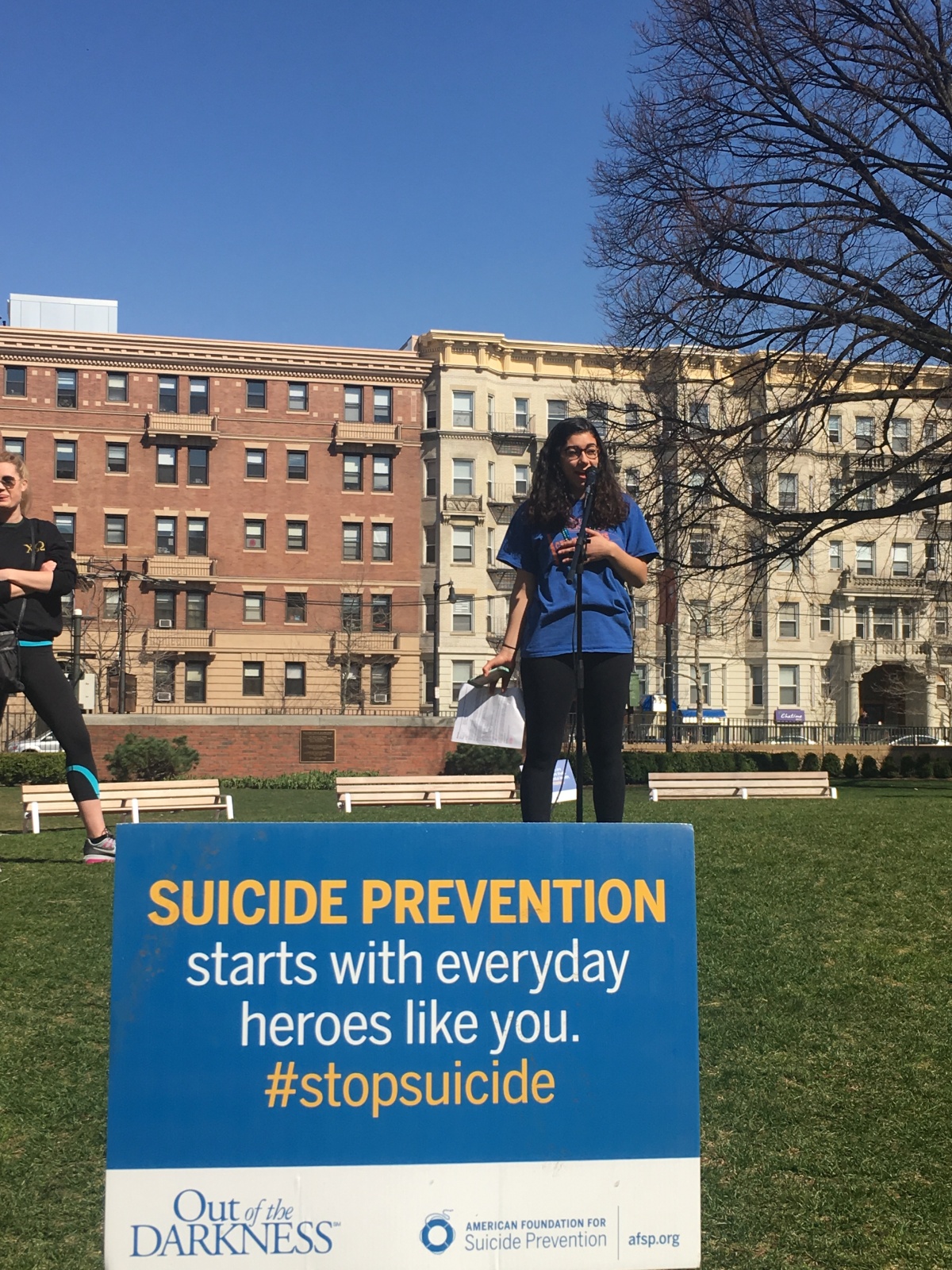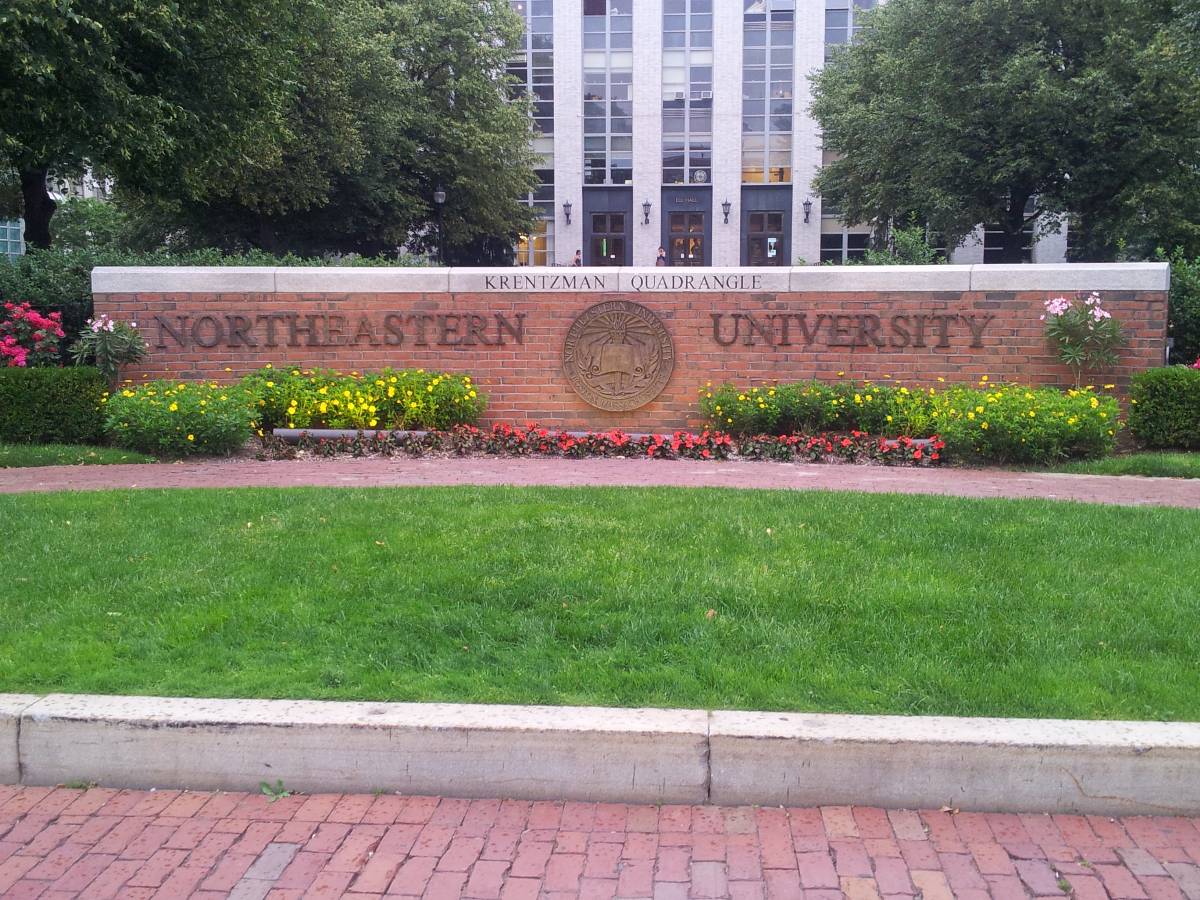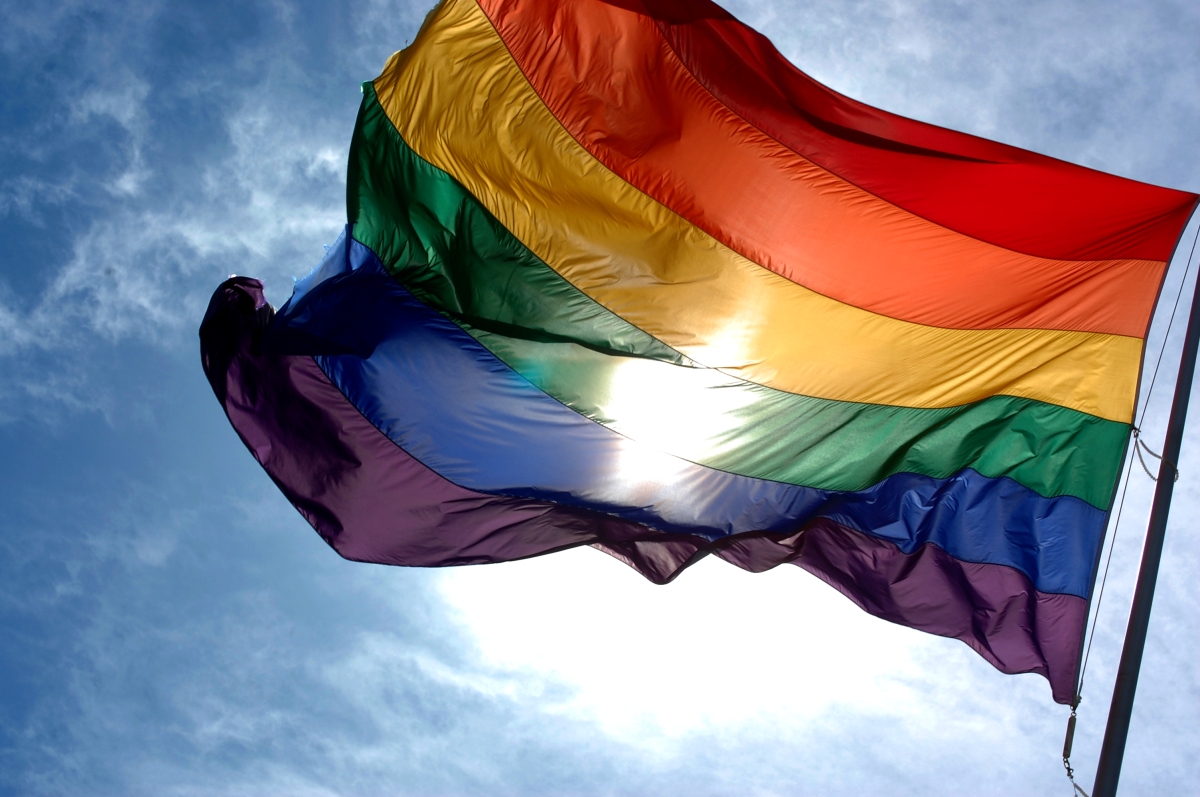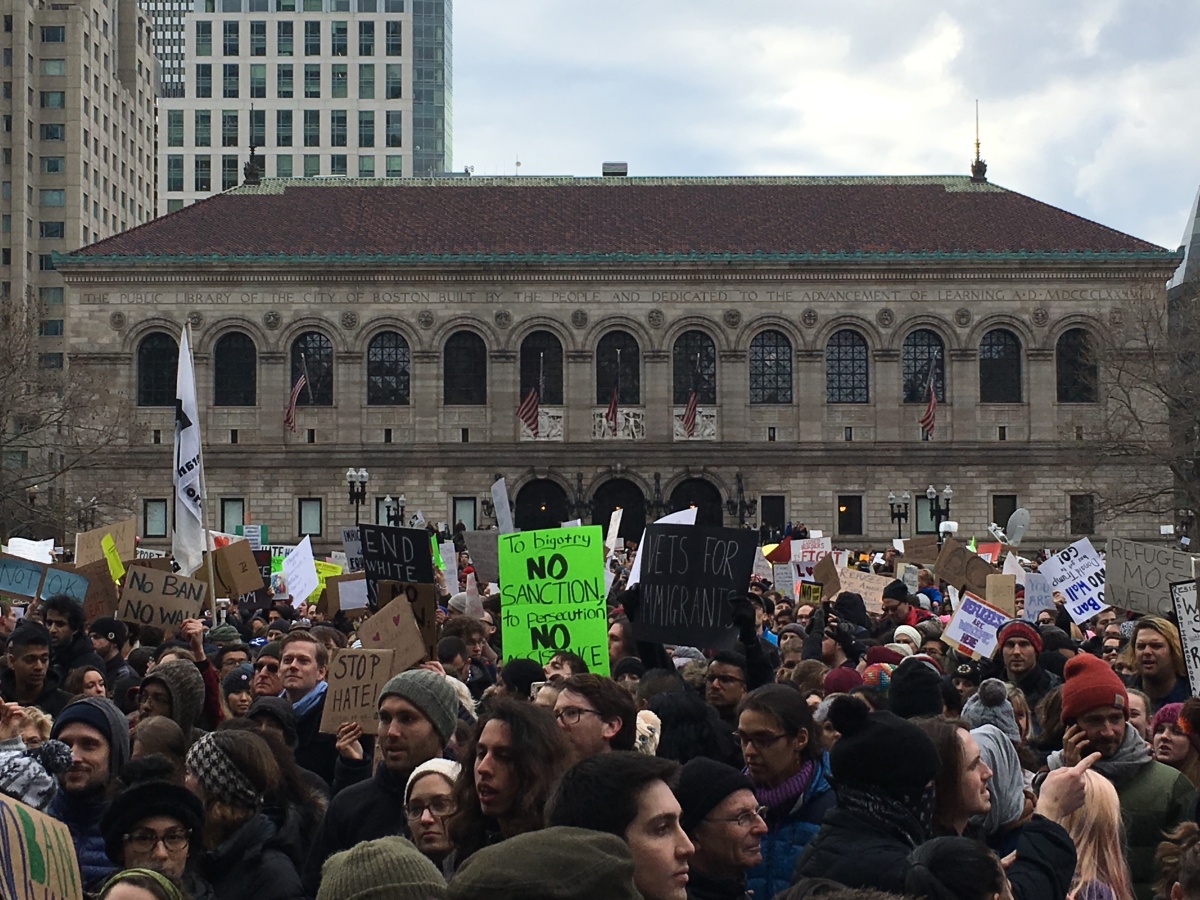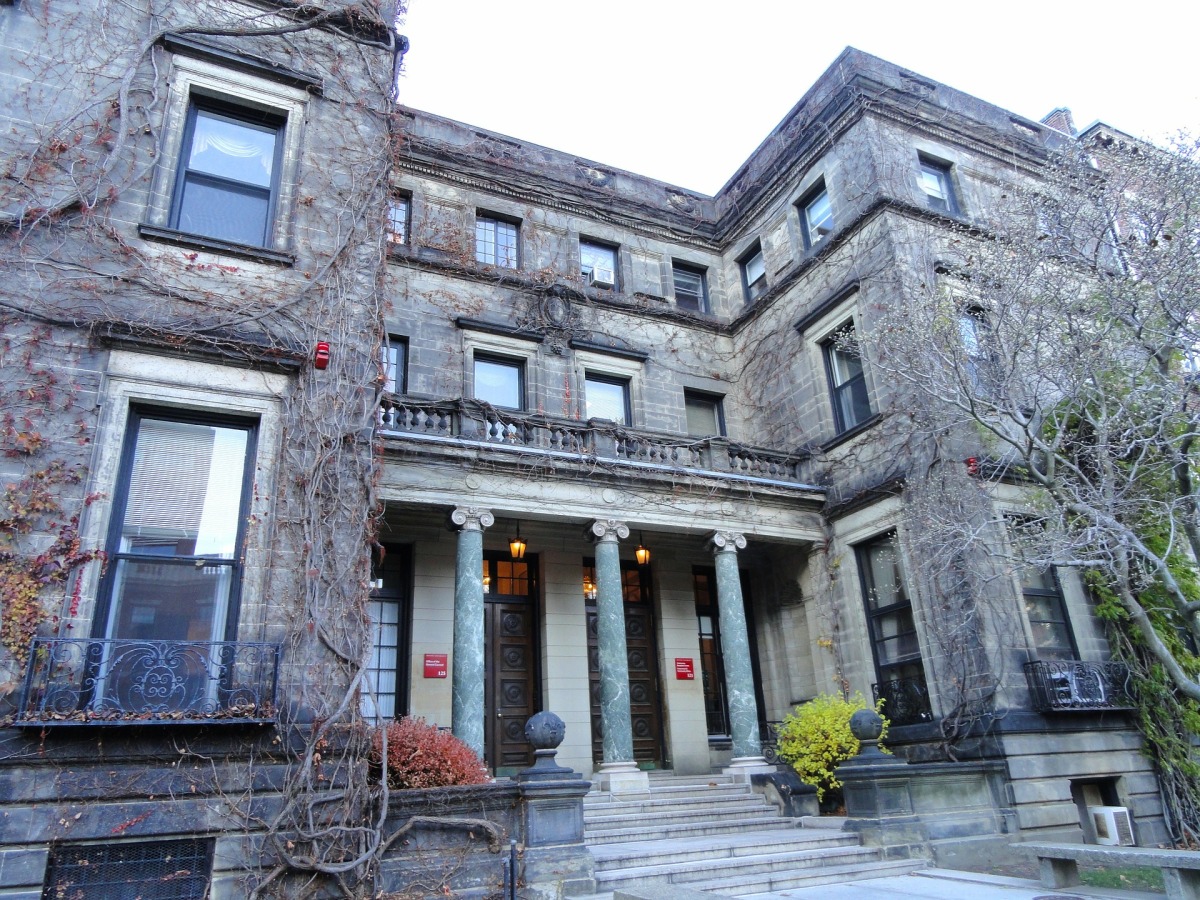There was a slightly nervous edge to the energy in the air as the sun rose over Krentzman Quadrangle early Saturday morning, catching the deep blues and striking yellows of signs carefully planted around the grassy knoll at its center. “Suicide prevention starts with everyday heroes like you,” read one, accompanied by a simple, forthright hashtag: “#stopsuicide.”
And for Northeastern University to host its first-ever Out of the Darkness Walk, a suicide prevention and advocacy event affiliated with and intended in part to fundraise for the American Foundation for Suicide Prevention, a fair share of everyday heroes turned out to be necessary – including third-year psychology major Isabel Irizarry, who coordinated the walk, and fourth-year human services major Laney Chace, who aided in organizing it through student group Behind the SMILE.
Contacted after the event, which drew nearly 100 students to campus for a three-mile walk around the area followed by student speakers and performances, both Irizarry and Chace acknowledge they went into Saturday less than assured of success. Even on the morning of, after a fundraising period that had exceeded two established goals and $7,000, there was a great deal of uncertainty as to whether more than 75 Northeastern students who’d registered online would actually attend.
“I was nervous but I was also really energized, more than I’ve been most mornings recently,” says Irizarry, looking back on the morning of the walk. “But I channeled the nervousness into energy I could put forth into the effort of organizing it.”
But as the handful of Huskies gathering in the quad reached double digits, then kept growing, the organizers say initial nerves gave way to a sense of purpose in finally carrying out the walk on which she and others in Behind the SMILE had spearheaded planning for more than half a year.
“The walk was amazing,” says Chace, with a matter-of-fact tone to her reflection. “Everything came together.”
The earlier part of Saturday had been spent turning Krentzman Quad into something of a homebase for the walk. Across four tables at the edge of the quad were laid out two registration stations (one for those who had fundraised, and another for day-of walkers), water bottles and granola bars, and a collection of multi-colored bead necklaces intended to symbolically identify walkers with their connections to suicide.
White beads symbolized loss of a child, red signified loss of a spouse or partner, silver meant loss of a first responder or military member, and gold denoted loss of a parent. More commonly displayed at this walk, however, were orange (loss of a sibling), purple (loss of a relative/friend), blue (for general support of the cause), teal (for those whose loved ones struggle), and – poignantly – green (for those who’ve struggled personally).
As more students streamed in, many soon made their way to the bead table, lifting the decorative objects around their necks and identifying their own relationships with suicide. Some nodded and others smiled at those around them brandishing similar colors.
“The beads are such an important way to express your connection to the cause without having to vocalize it,” says Irizarry. “They allow for us to look around at each other and know we’ve had similar, shared experiences. There’s a lot of comfort in that.”
Following opening remarks by Irizarry and AFSP Eastern Massachusetts Associate Area Director Michele Lee, who’d aided to organizing the walk, Monica Marotta, a second-year ASL/English Interpreting major, took control of the mic to discuss her personal connection to suicide – the loss of her friend, Tom, who’d attended SUNY New Paltz with Marotta prior to her transferring to Northeastern, and her grieving process after his death by suicide.
As the sun rose and 10 a.m. rolled around, Irizarry took to a mic set up on the knoll and encouraged students to join her in a walk around campus. Accompanied by upbeat music playing from a portable mini speaker, she led attendees on a pre-arranged route that wove throughout the campus and streamed down the sidewalk of bustling Huntington Avenue, completing a circuit three times to reach an approximately three-mile length that AFSP has encouraged in all its Out of the Darkness Walks.
“I felt like all our hard work created a really moving and beautiful display of solidarity on campus,” says Irizarry, looking back on the walk itself.
When students reunited at Krentzman Quad, many chatting with friends and peers they’d encountered along the walk, Northeastern a cappella groups ascended atop the knoll for performances envisioned in line with the Walk’s overarching themes of strength, awareness, and perseverance. Distilled Harmony performed “Bird Set Free” by Sia, followed Pitch, Please! singing “The Lion, the Beast, the Beat” by Grace Potter and the Nocturnals.
“I think that having a cappella performers there was impactful because it showed their support and their personal ties to the cause,” says Chace. “We were happy to be able to have these performers there because they added a sense of light and hope to the event and showed how much then Northeastern community can come together to share their art and passion through a lens of mental health advocacy.”
Another group, the Unisons, sang an arrangement of “Safe Inside” by James Arthur, before the event’s final student speaker, fourth-year chemistry major Jenna Malley, took the stage. Speaking passionately and openly about her own loss – that of a close personal friend named Kennedy – Malley highlighted her work through the AMAZING Campaign (a grassroots effort she launched via AFSP’s website) to bring further awareness to suicide prevention and awareness of mental illness on college campuses.
With Malley’s speech concluded, a final a cappella group – the Nor’easters – came before the mic for an earnest arrangement of “September” by Earth, Wind, and Fire. For many members of that group, the event was keenly personal; a Nor’easter member died by suicide in 2015, leading the group to highlight suicide prevention publically and through fundraising efforts for AFSP.
As the closing notes of the performance rang out across the quad, Northeastern’s first Out of the Darkness Walk essentially concluded, with organizers coming before the mic to thank attendees before leaving students to mingle, converse, and eventually disperse.
“I could feel our Northeastern community coming together to talk and express passion for such an incredibly important cause that is often overlooked on this campus and in colleges across the country,” says Chace, looking back on the event. “I hope that we were able to spread our message about compassion and empathy, and that our community at Northeastern will become stronger and more transparent about mental health and suicide moving forward.”
For Irizarry, success in pulling off the walk felt simultaneously like the first step in a new chapter of mental health advocacy on campus. “My hope is that people feel more like there’s a space for them to discuss issues of mental illness and suicide,” she says. “It’s a small step but an important one, making sure people know there is a movement, and even though it might be in its first steps, I think that’s empowering.”

